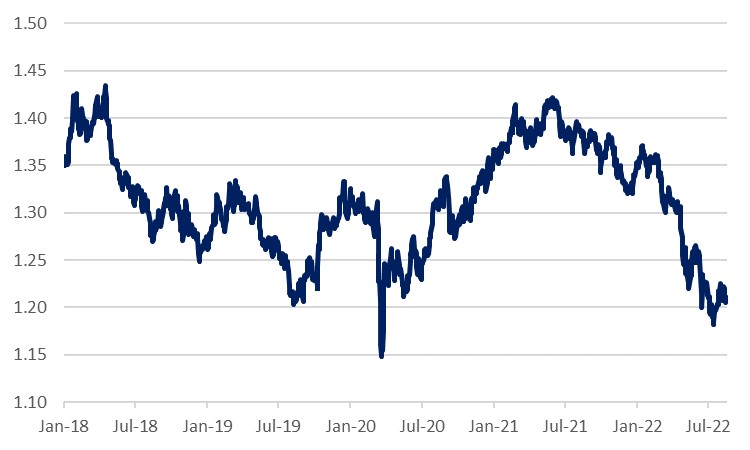.jpg?h=457&w=800&la=en&hash=067BE23EFD4E60CD237F4AC08BBE6456)
UK Prime Minister Theresa May has secured a draught withdrawal agreement with the EU after a week of through-the-night negotiations. The pound strengthened on the news, but in some regards the more difficult tasks lie ahead of her, as she must first secure cabinet backing before putting it to parliament for a meaningful vote on the matter. The details of the 500-page document are not yet public, but the key sticking point remains the backstop agreement, whereby the UK will remain in the customs union until another solution is found by which the UK can leave the EU without reintroducing a hard border in Ireland. The plan has found opposition on both sides of the leave/remain schism, and May has been meeting ministers individually since the deal was reached, before convening a full cabinet meeting later today.
Japanese GDP matched expectations for the third quarter, coming in at -0.3% q/q, compared to an expansion of 0.7% in Q2. On an annualised basis, the contraction was -1.2%, missing consensus forecasts of -1.0%. The weak growth figures were anticipated, owing to the natural disasters that hit the country during the reporting period, including flooding, earthquakes and typhoons, which disrupted factory output.
In Tunisia, the cabinet reshuffle proposed by Prime Minister Youssef Chahed was approved by parliament in what is seen as a political win for the embattled premier. The changes have been made in a bid to spur on the struggling economy. In less positive news, the IMF cautioned the country that it must keep its wage bill – among the highest in the world – under control, in the wake of a pay deal secured by the UGTT union last month. The IMF has previously suspended Tunisia’s support programme for not doing enough to its targets. Staying in North Africa, talks over Libya’s future held in Sicily over the past several days have concluded. No concrete progress was made, but the varying parties have agreed to convene once again early next year.
In Lebanon, Prime Minister-designate Saad Hariri has said that government formation has hit a ‘major roadblock’. The country remains without a government six months since May elections, holding back policy formation and the release of donor support.
 Source: Bloomberg, Emirates NBD Research
Source: Bloomberg, Emirates NBD Research
It was a choppy session of trading for treasuries. The curve bull steepened with yields on the 2y UST, 5y UST and 10y UST closing at 2.89% (-3 bps), 2.98% (-5 bps) and 3.14% (-4 bps) respectively.
Regional bonds closed lower as weakness in oil prices weighed on sentiment. The YTW on the Bloomberg Barclays GCC Credit and High Yield index rose to 4.7% and credit spreads widened to 173 bps.
According to reports, Qatar National Bank is looking to raise USD 500mn.
Amid a mixed employment report, GBPUSD was able to climb back above the 1.30 handle. While the ILO 3 month average unemployment rate rose to 4.1% in September from 4.0% the previous month, during the same period, average hourly earnings rose to 3.1% from 3.0%. This afternoon, investors will look towards the U.K. where inflation data is expected to show that consumer prices increased 2.5% y/y in October, up from 2.4% in September. Should the data be firmer than expected, it should be bullish for GBPUSD as combined with wage pressures, it maintains inflationary pressures above the Bank of England's policy makers target of 2%.
Developed market equities closed mixed as a sharp sell-off in oil weighed. The S&P 500 index dropped -0.2% while the Euro Stoxx 50 index added +1.0%.
Most regional equities closed lower. However, volumes were lower than average. The DFM index dropped -1.0%. Real estate sector stocks led the losses following comments from the CEO of Damac where he warned of a couple of difficult years ahead. Emaar Properties and Aldar dropped -1.2% each. Elsewhere, Sadafco closed limit up after the company announced a share buyback.
A bearish monthly report released by OPEC yesterday appears to have spurred an even more rapid acceleration in oil’s decline to that seen earlier in the week. Brent crude fell to a close of USD65.47/b, compared to recent highs of USD 86.29 just last month. This is the lowest level since March, when prices started mounting over fears about supply from Iran and Venezuela, among others. WTI has also dropped, to a close of USD55.69/b, a near 12-month low.
The oil-producing bloc predicted that global oil demand would increase by 1.29mn b/d next year, a significant downward revision of 70k b/d from the previous outlook. If the bloc were to continue producing oil at current levels, that would leave a considerable supply glut. This paves the way for the next OPEC meeting to result in a concerted policy change and an OPEC-wide measure to curb supply once more.
Click here to Download Full article